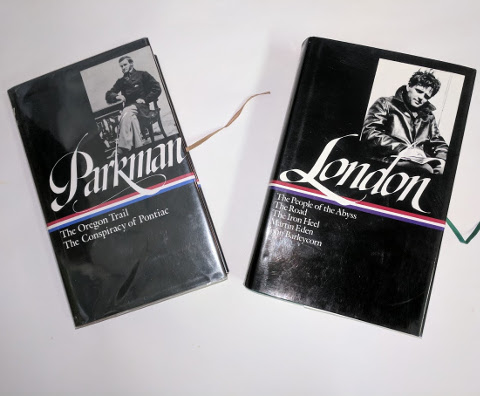Civilization --

Humanity's greatest accomplishment,
or failed experiment?
One of the benefits of owning a bookstore is that I always have and abundance of books on hand. I usually keep two or three on my reading stack at any given time and often the juxtaposition is as illuminating as the individual contents of the books themselves. This was the case recently when I was reading Francis Parkman's The Conspiracy of Pontiac and Jack London's The People of the Abyss. Although they were written on different topics and generations apart, they both had interesting things to say about civilization and its absence.
Jack London
was not a big fan of civilization
London's contribution is the pithier so I'll take him first. The People of the Abyss was written in 1902 about life in the London slums. In the final chapter London asks "Has Civilization bettered the lot of the average man?" and answers in the negative by comparing the conditions of the Innuit in Alaska with the condition of a dweller of London's slums. One can quibble that slum dwellers are not "average" but even allowing that the upper classes of London live much better that a typical Innuit, London still makes a pretty convincing case.
Francis Parkman
wrote about Indians when they still ruled most of America
The Conspiracy of Pontiac is a history of the great struggle between the natives of the land west of the Alleghenies against the encroaching English settlers. For an Indian war, it was a protracted struggle with large numbers both killed and captured. Concerning the latter, Parkman states that when it was time for the Indian tribes to return all their captives to their former homes, many were reluctant to return to the European way of life. Parkman is not the only one to say this. J. Hector St. John de Crevecouer in Letters from an American Farmer written around 1780 makes the same point saying that in his experience people who lived with the Indians long enough to become acculturated seldom were willing to return and when forcibly returned to white civilization, escaped back to the forest at the first opportunity.
In the 21st Century
has this changed?
The gap between civilization and the wilderness is greater today than it was one or two centuries ago. In 1650 or even 1850 whites and Indians were almost equally subject to the same diseases and the same quality of medicine. A return to the wilderness today means giving up antibiotics, cat scans and the rest of modern medicine. I for one would have a hard time unless there is way to distill insulin from tree bark or squirrels. But then, there are those who maintain that diabetes is a disease of civilization and there does seem to be a correlation at the very least.
And Yet,
why is pop culture so obsessed with apocalypses?
The fact is, we keep finding cures for things that were fatal 50 years ago. There are many fewer regions of grinding poverty than when I was young. London may still have slums but the kind of places that Jack London describes simply don't exist today. Why then, is so much science fiction about apocalyptic disaster? Either the collapse of civilization or some society built on oppression? The population is increasing but they are all going to the cities; there are more open spaces with no people than there were 100 years ago. Even today anyone who wants to go can walk out the door and just keep going. You will have to leave your phone behind though.
